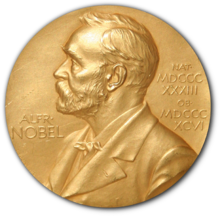Nobel Prize
| The Nobel Prize | |
|---|---|
 |
|
| Awarded for | Outstanding contributions for humanity in chemistry, economics, literature, peace, physics, or physiology or medicine |
| Country | |
| Presented by |
|
| First awarded |
|
| No. of laureates | 573 Prizes to 900 Laureates as of 2015[update] |
| Official website | nobelprize |
The Nobel Prize (/ˈnoʊbɛl/, Swedish pronunciation: [nʊˈbɛl]; Swedish definite form, singular: Nobelpriset; Norwegian: Nobelprisen) is a set of annual international awards bestowed in a number of categories by Swedish and Norwegian institutions in recognition of academic, cultural, and/or scientific advances.
The will of the Swedish inventor Alfred Nobel established the prizes in 1895. The prizes in Chemistry, Literature, Peace, Physics, and Physiology or Medicine were first awarded in 1901. Medals made before 1980 were struck in 23 carat gold, and later from 18 carat green gold plated with a 24 carat gold coating. Between 1901 and 2015, the Nobel Prizes and the Prize in Economic Sciences were awarded 573 times to 900 people and organisations. With some receiving the Nobel Prize more than once, this makes a total of 23 organisations, and 870 individuals—of whom 48 were women.
The prize ceremonies take place annually in , Sweden (with the exception of the peace prize, which is held in Oslo, Norway). Each recipient, or laureate, receives a gold medal, a diploma, and a sum of money that has been decided by the Nobel Foundation. (As of 2012[update], each prize was worth SEK 8 million or about US$1.2 million, €0.93 million, or £0.6 million.) The Nobel Prize is widely regarded as the most prestigious award available in the fields of literature, medicine, physics, chemistry, peace, and economics.
...
Wikipedia
